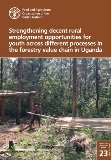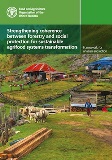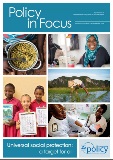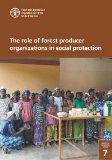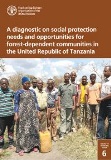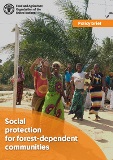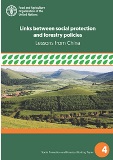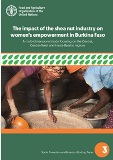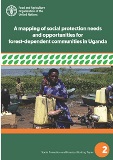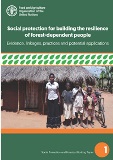
Social protection and forestry
Social protection is a set of policies and programmes designed to help reduce and prevent poverty and vulnerability, and ensure income security. Most food insecure and poor people with the greatest need for social protection live in rural areas and depend on natural resources – including forests – for their livelihoods. Forests serve as a safety net in times of crisis and increase the resilience of forest communities. However, forest-dependent communities are also vulnerable to ecological degradation and climate change, and are often in remote and disconnected rural areas characterized by low levels of market development and poor access to public goods and social services.
Social protection involves three pillars:
- Social assistance: alleviating chronic or transient poverty through non-contributory programmes, which are publicly provided, for most vulnerable individuals or households with limited other means of adequate support that can be provided in-kind or in cash.
- Social insurance: mitigating risks associated with poor health, old age, pregnancy (and post-natal care), unemployment, work injury and disability. Social insurance is derived from contributory schemes with part funding coming from the state.
- Labour market protection: creating employment and promoting livelihoods through generated economic opportunities, improved quality of employment and protects workers through improved working conditions, as well as training and skills development that target unemployed and underemployed rural workers.
FAO works to:
- expand the coverage of social protection to forest-dependent communities, households and forest workers
- strengthen the coherence between forestry and social protection policies and programmes
- improve the role of rural forest producer organizations in social protection
- promote decent forestry employment opportunities




Boosting youth employment in forestry in Uganda

©FAO Uganda
The Food and Agriculture Organization of the United Nations (FAO) today published a new study on strengthening rural employment opportunities for young people across Uganda's forestry value chain.
Strengthening decent rural employment opportunities for youth across different processes in the forestry value chain in Uganda assesses the policy environment for decent employment, in particular youth employment.
“This study builds on case studies to provide insights into the forestry employment situation in Uganda. It also offers valuable lessons for making forest value chains more inclusive, including suggested indicators for assessment and monitoring of decent employment in forestry,” said FAO Forestry Officer Qiang Ma.
The publication features case studies from across Uganda's forest sector, including tree nursery development, plantation management, sawn wood processing, and trading.
Policy, reality and opportunities in Uganda
The study underlines that Uganda's national legal and policy frameworks emphasize the participation of youth in the labour market. The national young people between the ages of 15 and 24 years account for 21.3 percent of the total population and 57 percent of the labour force. However unemployed youth represents 64 percent of total unemployed people, according to national statistics. The forest sector is an important employer, especially in the country’s rural areas. The Uganda Forestry Policy brings estimations that forestry employs about one million people across Uganda, comprising 100 000 people in the formal sector and 900 000 people in the informal sector. Youth in the forest sector are predominantly involved in charcoal production, followed by fuelwood collection, as these activities provide quick economic returns.
According to the publication, larger and formal forestry enterprises are more likely to focus on decent work provisions, while resource constraints prevent smaller enterprises to engage.
The report reveals that the Uganda national policy and legal framework for employment contains provisions that can benefit the forest sector. Opportunities exist for youth training and capacity building in forest management, as well as the provision of seed capital and other inputs to establish their own enterprises. For example, the Ministry of Gender, Labour & Social Development started a program on promoting green jobs and fair labour market in Uganda in 2016. The programme aims to support 1 000 women and youth groups with equipment, tools and training in green employment. Through partnership with UNDP, it also provides grants to young individuals and groups commencing or undertaking innovative projects. This presents opportunities for youth to access these grants for developing forestry enterprises.
Recommendations to improve
The report makes a series of recommendations to improve young people's opportunities in forestry-related jobs.
Among these are the need to provide occupational safety and health training, as well as skills development in sustainable forest management targeting rural youth.
The study also recommends strengthening the country’s existing Green Jobs Programme, which promotes investment in forest-based jobs, emphasizing their contribution to reducing poverty and achieving the Sustainable Development Goals.
In addition, policies and programmes that promote and incentivize market-oriented agroforestry should be specifically targeted at youth and geared toward developing small-to-medium-sized agroforestry enterprises.
The study also highlights the need to promote social protection for forest sector workers. Because working arrangements are often informal and short-term, appropriate social protection schemes are a precursor to achieving decent work for young people – and all forestry workers. Voluntary or semi-compulsory contributory schemes, with benefits that may include health insurance, disability and injury compensation, paid maternity leave, and workman's compensation, among others, can help provide this essential protection, according to the publication.
Ensuring young people are engaged in policy is also important, the report underlines. Rural youth could benefit by participating in collective action to acquire assets and resources and be part of policy processes. Organizations that represent youth interests should prioritize forest sector participation and decent work for youth in the sector on their lobbying agenda, the publication suggests.
Related publication
Publications
Events
22/ 7
2020
Social protection for forest-dependent communities: Building on the response to the COVID-19 pandemic for more resilient forest livelihoods
Virtual Event, 22/07/2020
Increasing knowledge on the role and opportunities of social protection in the COVID-19 response and to support recovery for forest-dependent communities.
5/ 6
2019
6/6
2019
Expert meeting to discuss the draft guiding framework for strengthening coherence between forestry and social protection for forest-dependent communities
Rome (Italy), 05/06/2019 - 06/06/2019
The objective of the expert meeting is to provide technical comments and inputs to the draft guiding framework for strengthening coherence between forestry and social protection for forest-dependent communities. FAO Forestry Division is developing this guiding framework in cooperation with the UNU-MERIT.
19/ 7
2018
Creating synergies between forestry and social protection
Rome (Italy), 19/07/2018
Since 2016, FAO has worked to expand the coverage of social protection measures to forest-dependent communities and to strengthen coherence between forestry and social protection.

